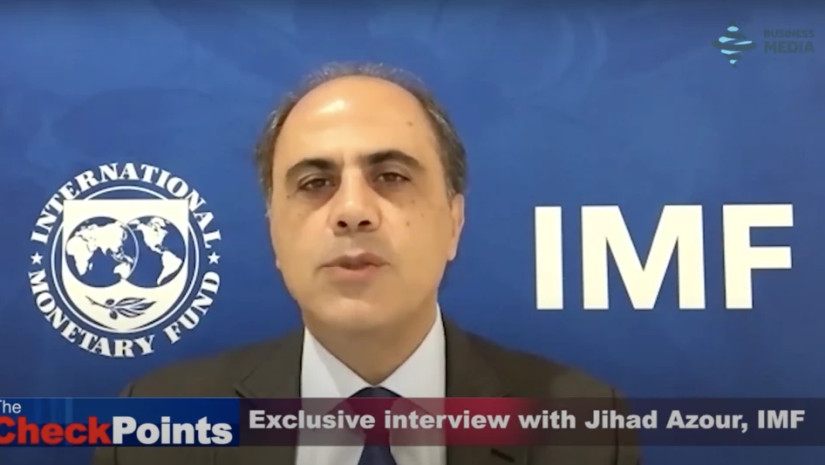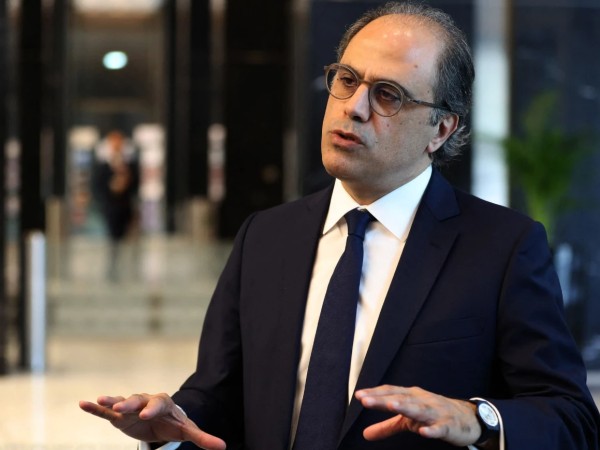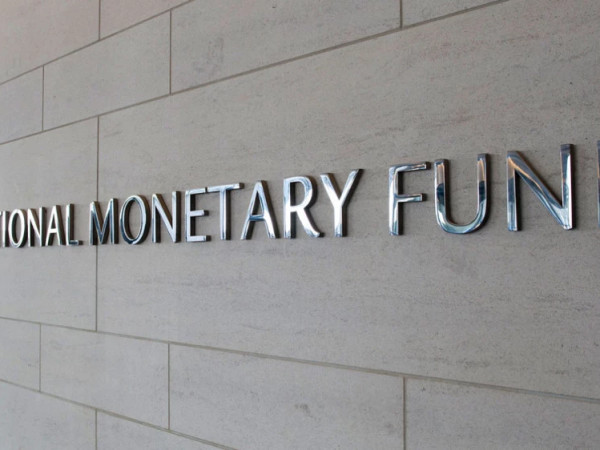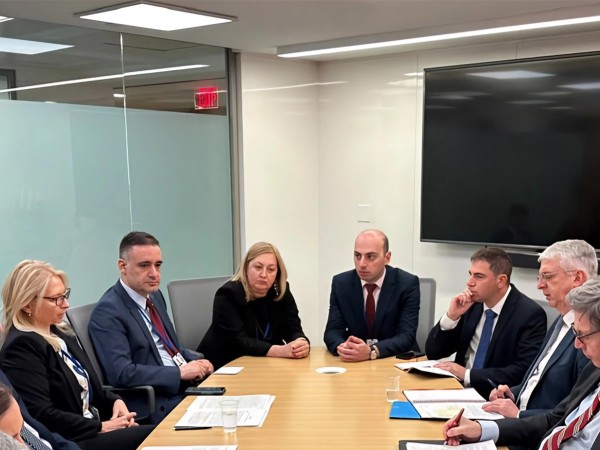Georgia's GDP per capita will increase by USD 533 compared to the previous year - according to an updated World Economic Outlook for Georgia by the IMF. With this indicator, Georgia is on the 106th place among 196 countries in the world. At the same time, according to the IMF, in 2022, Georgia's GDP per capita will increase by another USD 489 and it will reach USD 5,297. What are the main emphasis of the current IMF World Economic Outlook for Georgia and how can this country improve its economic performance? Jihad Azour from the IMF answered these and more questions in our exclusive interview.
A very interesting emphasis in this current outlook on the labor markets and also the role of informality. According to Geostat, we can see that informality level in non-agricultural sectors in Georgia is about 32%. What are some main findings in the outlook on Georgia specifically and where does Georgia stand regionally if we look at the level of informal economy in the region?
Well, this year we put the focus on two key areas to understand the impact of the crisis and also to see how countries could recover. And these two areas were labor market impact as well as also the impact of the crisis on the corporate sector. And in both cases the analysis has shown that the crisis had a big toll on labor especially on vulnerable groups – those who are in the informal economy. Usually the informal sector constitutes a kind of a buffer during crisis – this time because of the nature of the COVID-crisis and because it affected a certain number of high intensive contact sectors, impact on I would say informality was high. Going forward, what would help is to accelerate growth, address the scarring risks through structural reforms, improve the attractiveness of the economy and last but not the least, modernize both – markets by increasing capacity development, training employees and also by strengthening the social protection systems.
In this direction one very strict recommendation of the IMF going forward for Georgia is to focus on fiscal consolidation. IMF mentions that currently Georgia has very tight fiscal room for adjustment and it recommends Georgia to look at the capital projects rather than social expenditures. Why is that, because when we are talking about labor market specifically the logic might also be that capital projects bring employment opportunities and this further boosts economic growth. So, what is the logic for the IMF’s this specific advice for Georgia?
As you know Georgia has implemented important set of reforms that helped Georgia improve its economic outcome and in the context of IMF supported programs Georgia was able to improve several economic and financial indicators. The IMF recommendations are in the short term to strengthen the recovery and maintain the support that has been provided to vulnerable groups gradually unwinds some of the measure that were used last year and this year in face of the COVID shock, and going forward through rebalancing of the fiscal policy to provide more support socially as well as to strengthen the recovery. In addition to that we believe accelerating structural reforms by improving business environment, increasing competitiveness of the SOEs, as well as also for some targeted investment projects that help improve education, capacity development and training – this will allow the Georgian economy to accelerate the recovery. Mind you that projections of recovery this year of 7% and next year of 5.5% are among the strongest for the Caucasus and Central Asia.
Yes, my question stems exactly from this. In outlooks we see that this year the economy might grow 7.7% according to the IMF and then slow down to 5.5% - so, why choose capital projects as the main target for the fiscal consolidation and not some other measures that have been introduced during the pandemic?
Let me clarify here. The recovery of 7% is a J-curve recovery – a strong recovery and on the medium term levels of growth of 5-5.5%re higher than the average growth in the region. This is still a very good level of growth.
Base effect is also still there, right, with this 7%? Yes, and also on the corporate side of the outlook – this is the first time after the first waves of the pandemic that we’ve seen written black on white such words – the elevated uncertainty. What is the reason for that and why is uncertainty growing again?
Well, as you know this crisis was the massive crisis that affected many countries. Especially in countries we saw the scarring risks for sectors where we have high intensive contact – tourism sector as well as other service intensive sectors. For Georgia these sectors are important. In the beginning our recommendations for the countries were to provide support to economy to save lives and livelihoods and then gradually address issues to avoid massive scarring and then issues to allow the economy to recover. This is what happened over the last year and a half. Acceleration of vaccination that we saw in the region and also in Georgia are steps in the right direction. Going forward where the priorities are: One is to balance between the strong recovery but also to address the transformation of those economies including the Georgian one in order to on one hand maintain and address the risks that we saw over the last year but also to strengthen the recovery. Therefore, on that fiscal has to gradually normalize by unwinding the measures as the recovery is strengthening - to unwind in order to reduce risks on inflation. Reforming SOEs and modernizing the infrastructure are also the steps towards accelerating the medium term recovery.
Mentioning structural reforms, mentioning SOEs – we are waiting for another IMF program for Georgia. At this point, from what we know, the negotiations haven’t yet started with the Georgian Government. Do you think Georgia will have another IMF supported program?
As you know the authorities have signaled their interest in another IMF support to their programs. The previous program has been successful. A mission will be visiting Georgia to discuss with the authorities and we hope that in the beginning of next year we will present the board with the potential program for Georgia.
In the beginning of the next year. And lastly, investing in the future to emerge stronger – what are some steps that countries need to take individually and regionally together to invest in the future so that they emerge stronger out of this pandemic?
The pandemic crisis has shown us certain important developments. One – there are certain number of silver linings: technology, green recovery are important opportunities for many countries to accelerate their recovery. In case of Georgia and countries in the region, also the new global value chains are the opportunity of growing intra-regional trade and investment proved also to be opportunity for countries to accelerate their growth. Of course, for that what is needed is to have and to improve access to finance, access to opportunities by improving and modernizing labor market, building skills; continue the transformation of the economy through structural reforms; improve the performance of SOEs, as well as also increase the overall macroeconomic stability by maintaining the inflation under control to keep the overall macroeconomy stable. Those are I would say for Georgia as well as also for the region – some policy recommendations that the IMF considers would be useful going forward.
You say that for Georgia in 2021 the inflation will be somewhere around 13% and then you say that starting from 2022 it will gradually come down to 3.17%. What should happen for such say sharp decline?
As you know inflation is global due to food and commodity prices. We expect after the peak of 2021 that inflation will gradually normalize. Of course, this requires from monetary authorities, central banks to avoid the anchoring of inflation expectations by maintaining the appropriate levels of interest rates and when needed to increase interest rates in order to address the risk of spill over and the anchoring of inflation expectations. And this is what the Central Bank in Georgia and in some other countries in the region have been doing in the last few months. If inflation is to become more challenging, additional measures will be needed. But this depends on the nature of the inflation and its risks.















